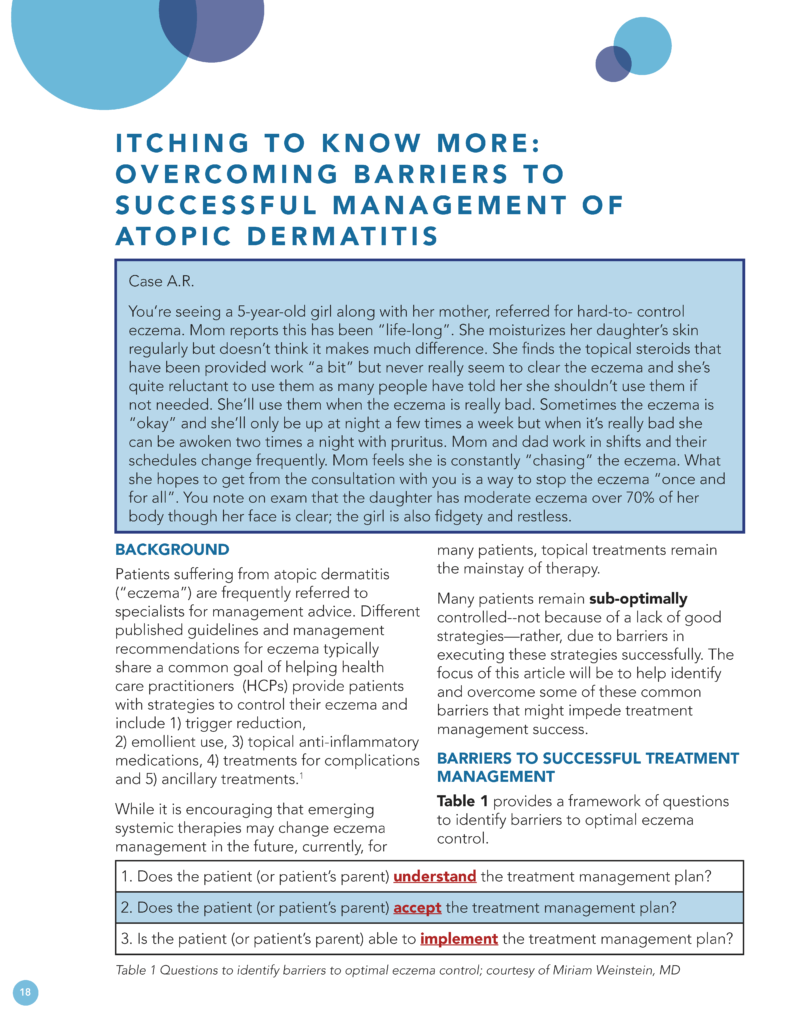Itching to Know More: Overcoming Barriers to Successful Management of Atopic Dermatitis
DOI:
https://doi.org/10.58931/cait.2021.1213Abstract
Patients suffering from atopic dermatitis (“eczema”) are frequently referred to specialists for management advice. Different published guidelines and management recommendations for eczema typically share a common goal of helping health care practitioners (HCPs) provide patients with strategies to control their eczema and include 1) trigger reduction, 2) emollient use, 3) topical anti-inflammatory medications, 4) treatments for complications and 5) ancillary treatments. While it is encouraging that emerging systemic therapies may change eczema management in the future, currently, for many patients, topical treatments remain the mainstay of therapy. Many patients remain sub-optimally controlled–not because of a lack of good strategies—rather, due to barriers in executing these strategies successfully. The focus of this article will be to help identify and overcome some of these common barriers that might impede treatment management success.
References
Eichenfield LF, Tom WL, Berger TG, Krol A, Paller AS, Schwarzenberger K, et al. Guidelines of care for the management of atopic dermatitis : Section 2. Management and treatment of atopic dermatitis with topical therapies. J Am Acad Dermatol. 2014 Jul;71(1):116-32. doi:10.1016/j.jaad.2014.03.023
Barbarot S, Bernier C, Deleuran M, De Raeve L, Eichenfield L, El Hachen M, et al. Therapeutic Patient Education in Children with Atopic Dermatitis: Position Paper on Objectives and Recommendations. Pediatr Dermatol. 2013 Mar-Apr;30(2):199-206. doi:10.1111/pde.12045
Corcimaru A, Morrell DS, Burkhart CN. The Internet for patient education on atopic dermatitis: Friend or foe? J Am Acad Dermatol. 2017 Jun;76(6):1197-1198. doi:10.1016/j.jaad.2017.01.054
Li AW, Yin ES, Antaya RJ. Topical Corticosteroid Phobia in Atopic Dermatitis: A Systematic Review. JAMA Dermatol. 2017 Oct 1;153(10):1036-1042. doi:10.1001/jamadermatol.2017.2437
Morrison A, Glick A, Yin HS. Health Literacy: Implications for Child Health. Pediatrics Rev. 2019 Jun;40(6):263-277. doi:10.1542/pir.2018-0027
Sarre ME, Martin L, Moote W, et al. Are baths desirable in atopic dermatitis? J Eur Acad Dermatol Venereol. 2015 Jul;29(7):1265-1274. doi:10.1111/jdv.12946
Sauder MB, McEvoy A, Sampson M et al. The Effectiveness of Written Action Plans in Atopic Dermatitis. Pediatr Dermatol. 2016 Mar-Apr;33(2):e151-3. doi:10.1111/pde.12774
Moret L, Anthoine E, Aubert-Wastiaux H, et al. TOPICOP (c): A New Scale Evaluating Topical Corticosteroid Phobia among Atopic Dermatitis Outpatients and Their Parents. PLoS One. 2013 Oct 16;8(10):e76493. doi:10.1371/journal.pone.0076493
Hong E, Smith S, Fischer G. Evaluation of the Atrophogenic Potnetial of Topical Corticosteroids in Pediatric Dermatology Patients. Pediatr Dermatol. 2011 Jul-Aug;28(4):393-6. doi:10.1111/j.1525-1470.2011.01445.x
Miller J, Roling D, Margolis D, Guzzo C. Failure to demonstrate therapeutic tachyphylaxis to topically applied steroids in patients with psoriasis. J Am Acad Dermatol. 1999 Oct;41(4):546-9.
Silverberg JI, Gelfand JM, Margolis DJ, Boguniewicz M, Fonacier L, Grayson MH, et al. Patient burden and quality of life in atopic dermatitis in US adults : A population-based cross-sectional study. Ann Allergy Asthma Immunol. 2018 Sep;121(3):340-347. doi:10.1016/j.anai.2018.07.006
Matterne U, Bohmer MM, Weisshaar E, et al. Oral H1 antihistamines ad ‘add-on’ therapy to topical treatments for eczema. Cochrane Database Syst Rev. 2019 Jan 22;1(1):CD012167. doi:10.1002/14651858.CD012167.pub2
Long CC, Finlay AY. The finger-tip unit-a new practical measure. Clin Exp Dermatol. 1991 Nov;16(6):444-7. doi:10.1111/j.1365-2230.1991.tb01232.x

